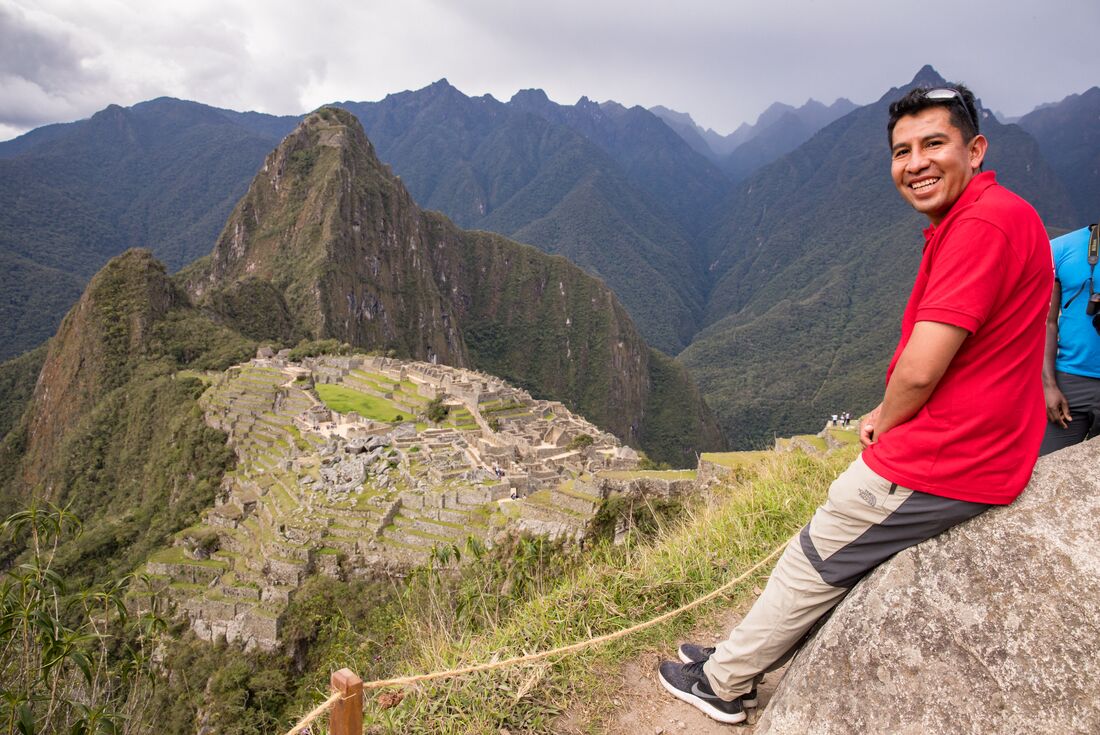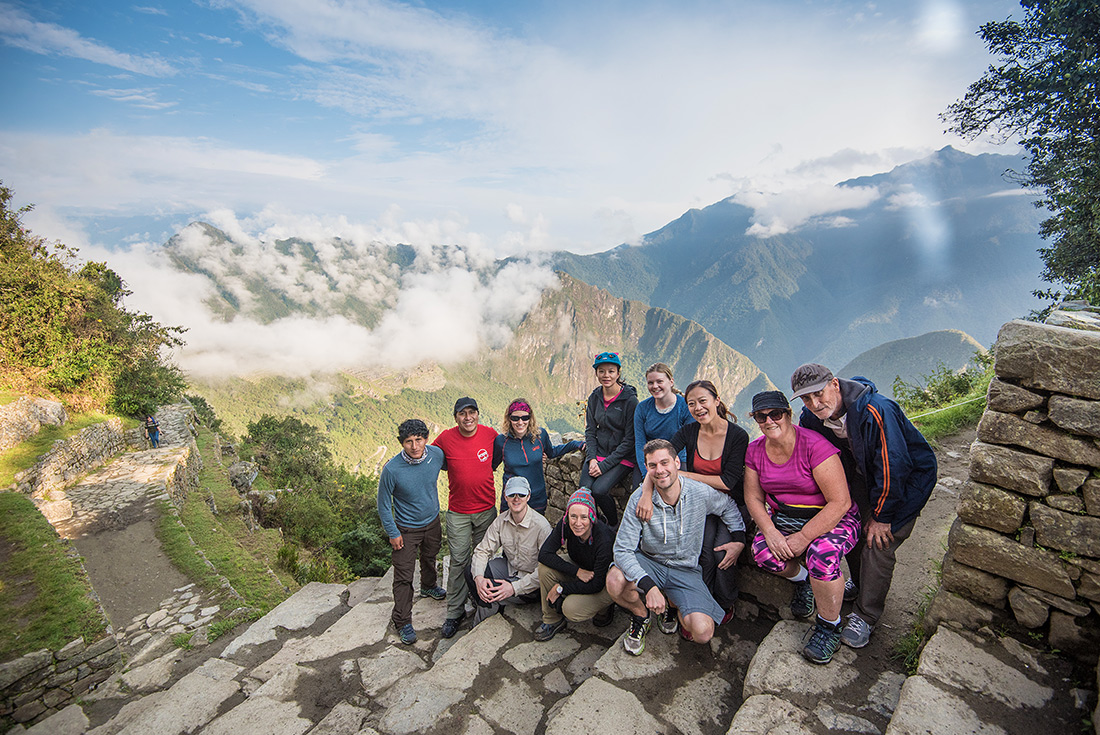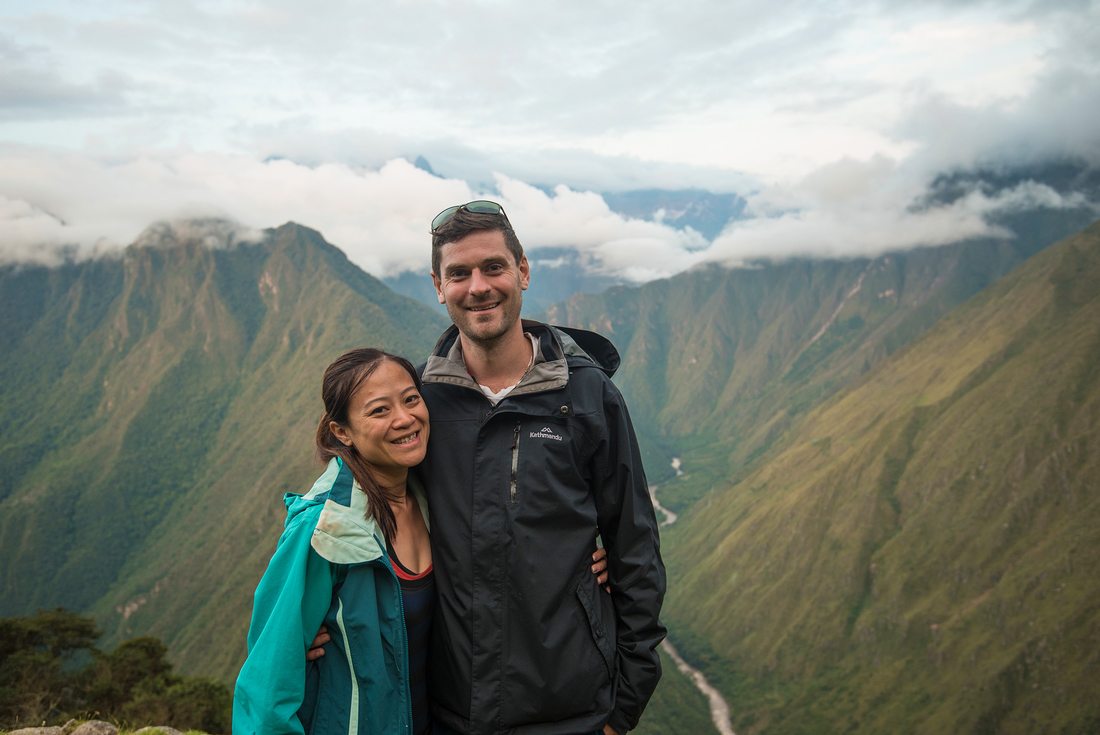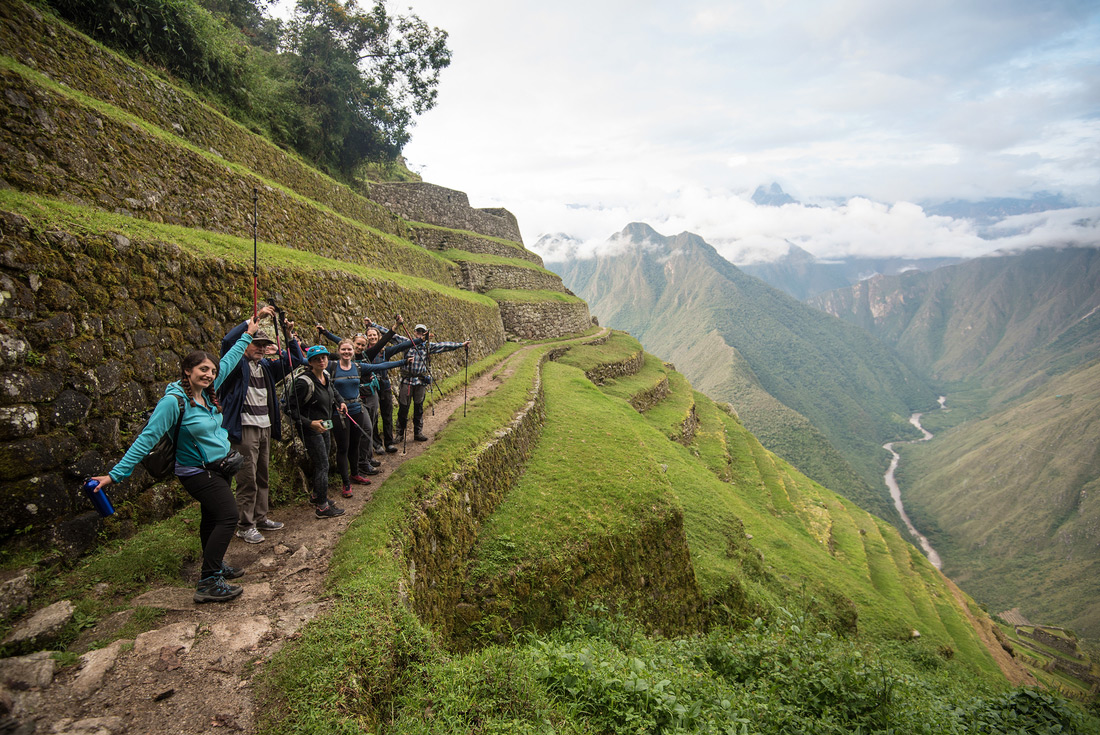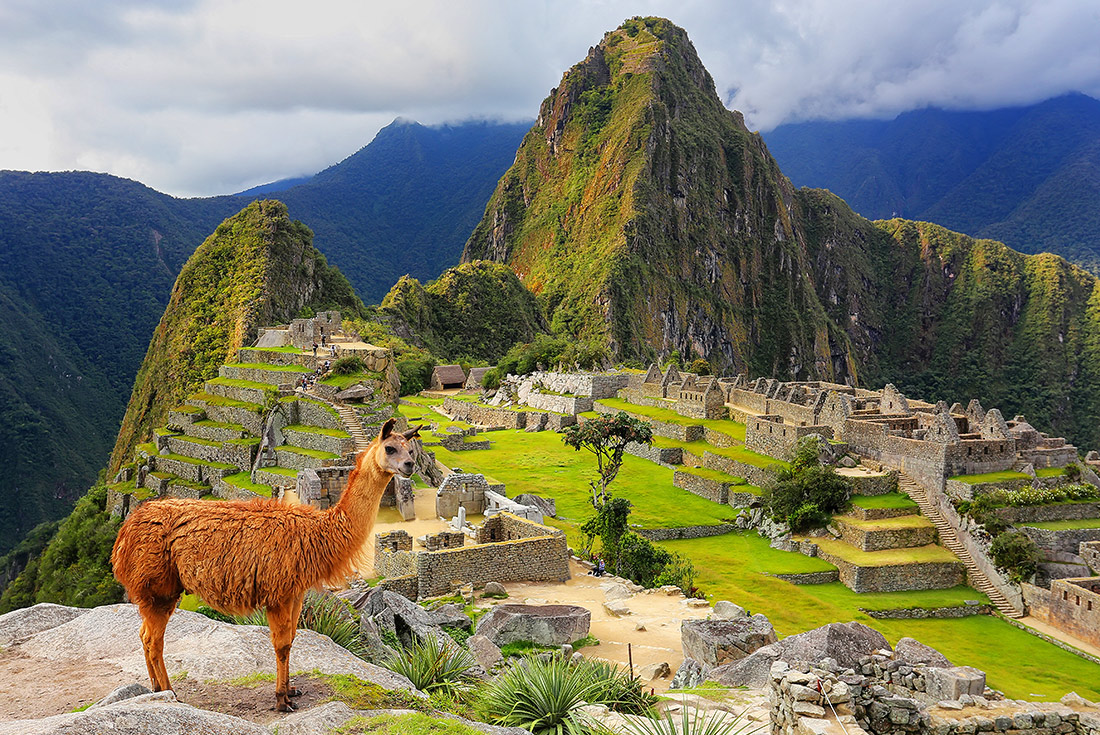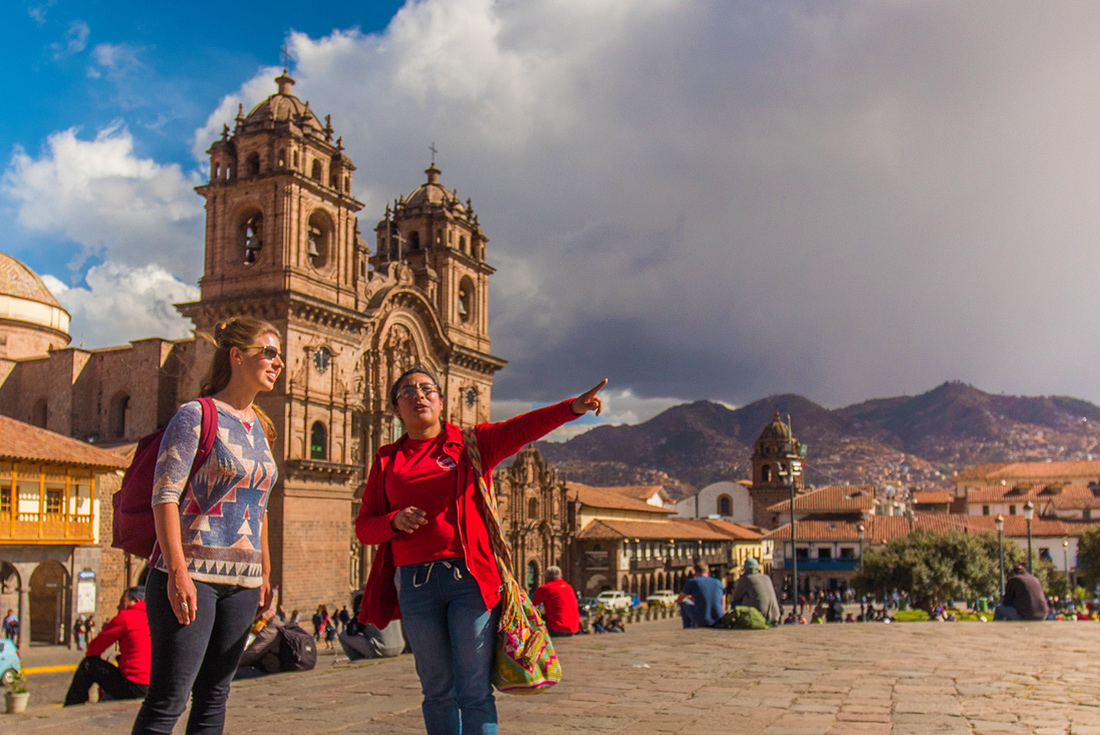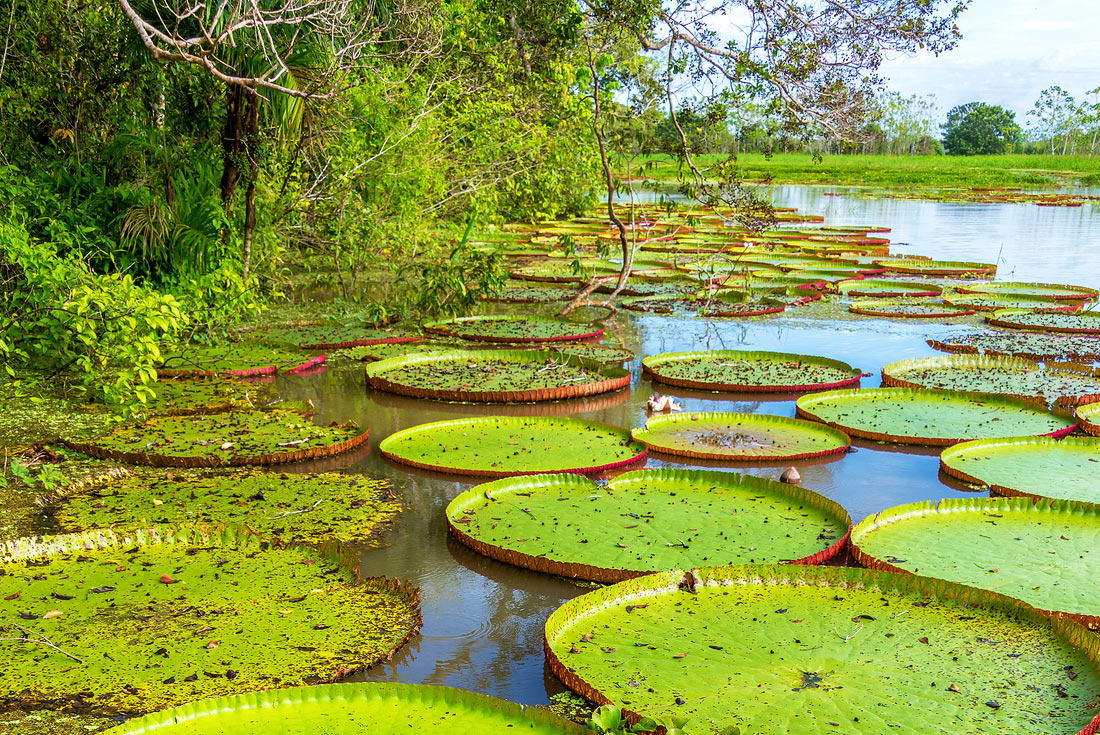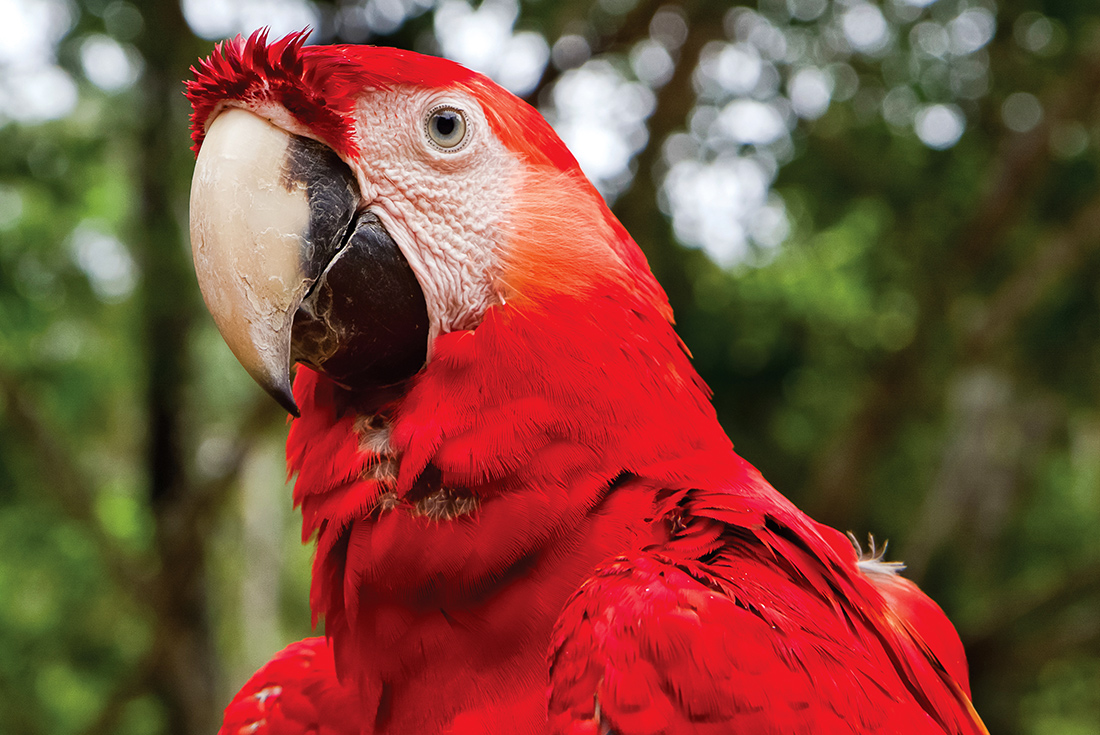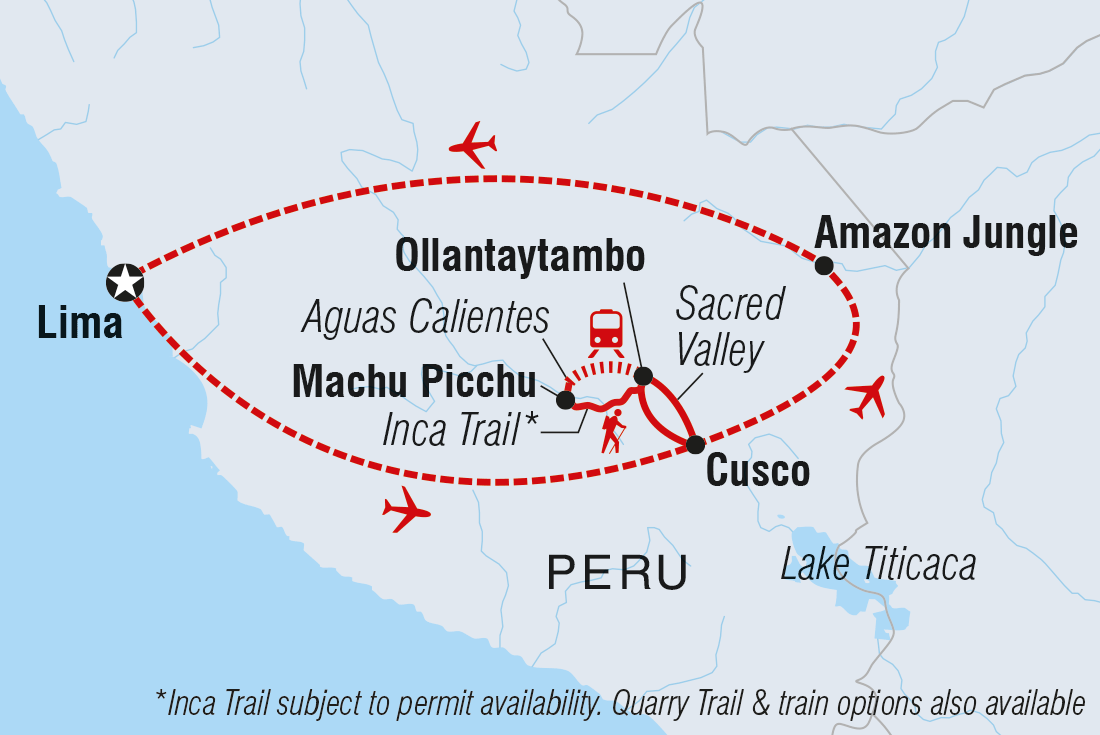Account Number : 63245268
Sort Code : 204281
Inca Trail & Amazon Adventure
Inca Trail & Amazon Adventure
Travel from the heady heights of the Andes to the exotic lowlands of the Amazon on this journey through the best of Peru. Get acquainted with the charm and grace of historic towns before hiking along ancient pathways to Machu Picchu and discovering the heart and soul of the Inca Empire. Then eyeball exotic plant and wildlife in the world's most remarkable jungle. From vibrant cities to glorious natural wonders, this trip shows you all corners of Peru.
Tour At a Glance
- Explore Cusco, South America's oldest continuously inhabited city. The city has ancient foundations, an interesting blend of Incan and colonial influences, and seemingly endless things to do and see.
- Adjust to the altitude with a pisco sour and some ceviche to get to know Peruvian cuisine.
- Travel through the Sacred Valley – known for its steep and soaring scenery, its mystical significance for the Inca and the indigenous cultures that still reside here.
- Explore the greatest icon of ancient South America and one of the Seven Wonders of the world – Machu Picchu – on a guided tour.
- Experience the untouched, evergreen splendour of the Amazon Jungle. Explore rainforest trails with a local guide, looking out for monkeys, parrots and medicinal plants, then fall asleep in a lodge lit by candles and kerosene lamps.
- Tour code: GGSEC
- Group Adventure
Dates & Prices
Is this trip right for you.
- This trip visits places that are at high altitude, and as a result some people can suffer from altitude sickness, regardless of age or physical health. Please see the Medical and health information section of the Essential Trip Information for more detail.
- This trip involves a lot of walking to see the sites, and if you trek the Inca Trail or Quarry Trail, there'll be strenuous hiking. The trip is recommended for those with a good level of fitness. Please bring comfortable footwear suitable to hiking. See the ‘Packing’ section of the Essential Trip Information for more detail.
- For those who trek the Inca Trail or Quarry Trail, you'll be camping with basic facilities. It's definitely the journey as well as the final destination (Machu Picchu) that makes this way of exploring Peru worthwhile.
- According to Machu Picchu visiting regulations, all visitors must follow a pre-determined route within the site. This route must be followed in one direction only, and once the guided visit commences exiting and re-entering the site is not permitted. Once the guided visit concludes, visitors must exit the site and personal exploration of Machu Picchu is not permitted. Please refer to the Itinerary for details.
- Travellers who choose different ways of reaching Machu Picchu (Inca Trail, Quarry Trail or Train), will not follow the same routes within Machu Picchu. This means that you may not be able to have photos together, overlooking Machu Picchu. This applies to travellers on the same booking or separate bookings.
- Temperatures in the Amazon can fluctuate from daytime humidity to night-time chill. Insects, especially mosquitoes, are common. We recommend tropical-strength insect repellent and light cotton clothing that covers your arms and legs, with warmer layers for the evening.
- Can't decide which trek is for you? Read up on them here: Inca trail permits are limited and it's important to book well in advance, read more about it here:
Accommodation
- Route 1 Inca Trail: Camping with basic facilities (3 nights)
- Hotel (6 nights). Route 2 - Quarry Trail: Camping with basic facilities (2 nights)
- Hotel (7 nights). Route 3 - Train option: Hotel (9 nights)
- All Routes: Jungle Lodge (2 nights)
Joining point instructions
Intrepid can assist with pre-booking an arrival transfer from the airport - enquire with your agent. Please advise your flight arrival details at least 14 days prior to your departure.
If you have a confirmed arrival transfer, you’ll be met in the Arrivals Hall by a transfer representative holding an Intrepid sign. As you exit customs, you’ll pass taxi remise counters before you see the fence of the Arrivals Hall, behind which your transfer representative is waiting. Please ask them who they’re picking up to confirm you’ve met the correct transfer representative. Depending on traffic, the journey to your hotel will take between 30 and 90 minutes.
In case of flight cancellations, changes, or unforeseen delays, please contact our local office on the number in the ‘Problems and emergency contact information’ section. Free wifi is available at the airport. Alternatively, please go to the information booth located between the two escalators on the left hand side. If required, they can make a phone call for you. This is also where our transfer representatives will go if they don’t meet you at the fence as you exit customs.
Alternatively, you can take a taxi from the airport to your hotel. We recommend TAXI GREEN, who have counters in the Arrivals Hall where you can arrange a taxi for PEN80. We advise against using taxis outside the terminal as their prices are very high.
Safety
- Most national governments provide regularly updated foreign travel advice on safety issues involved with international travel. We recommend that you check your government's advice for their latest travel information before departure and ensure that your travel insurance covers you for all destinations and activities on your trip. Please refer to our website's safety page for links to major travel advisories and updates on safety issues affecting our trips here: We strongly recommend the use of a neck wallet or money belt while travelling, for the safe-keeping of your passport, flight tickets, cash and other valuable items. Leave your jewellery at home - you won't need it while travelling. Many of our hotels have safety deposit boxes, which is the most secure way of storing your valuables. A lock is recommended for securing your luggage. Your group leader or local representative will accompany you on all included activities, however, during your trip you'll have some free time to pursue your own interests or relax and take it easy. While your group leader or local representative will assist you with the available options in a given location, please note that any optional activities you undertake are not part of your Intrepid itinerary, and Intrepid makes no representations about the safety of the activity or the standard of the operators running them. Please use your own good judgement when selecting an activity in your free time. Please also note that your group leader or local representative has the authority to amend or cancel any part of the trip itinerary if it's deemed necessary due to safety concerns. Intrepid's operational safety policies can be viewed on our website at the link below. We recommend that you take a moment to read through this information before travelling, and would appreciate any feedback on how safety is being managed on our trips.
- Demonstrations and protests occur regularly and can turn violent. National or regional strikes can be called at short notice and can disrupt domestic air travel, public transport and road networks. In the past, protestors have also caused disruption to Juliaca airport, Cusco airport and rail services to Machu Picchu. Avoid protests, demonstrations or large gatherings. Street crime, including muggings and thefts, is a significant problem in Lima, Cusco, Arequipa and other major cities. Be vigilant in public places and when withdrawing cash from ATMs. Avoid walking alone in quiet areas or at night. As with travel across the country, you should remain aware of your surroundings and avoid wearing or displaying expensive items. In the event of a robbery, do not attempt to resist attackers or take any action that puts you at greater risk. Tourists have been the targets of robbery by bogus taxi drivers. Do not hail taxis on the street and instead only use licensed telephone or internet-based taxi services whenever possible, or ask your hotel to book one for you. Be particularly careful when arriving at Jorge Chavez International Airport in Lima and only use one of the official taxi companies located at desks directly outside the arrival hall. Tourists are sometimes offered ‘spiritual cleansing’ programs in the Amazon area, Northern Peru and Cusco. These are sometimes called Ayahuasca or San Pedro and typically involve the consumption of dimethyltryptamine (DMT), an hallucinogenic drug. These practices are not regulated and people have suffered serious illnesses and in some cases death after participating in these ceremonies.
- HIKING IN PERU In accordance with local laws governing tourism in Peru, trekking groups of up to and including 8 trekkers must be led by one local guide. The evacuation of an injured traveller in normal conditions may take more than 8 hours. For your own safety, it's crucial that you adhere to the local guide's safety instructions, particularly in regard to how to prevent trekkers getting separated or lost. Your leader will also conduct a safety discussion before our trekking activities.
- PETTY THEFT AND PERSONAL SAFETY While travelling there is always the risk of pick-pocketing and petty theft, particularly in the more touristy cities. We recommend that you exercise caution when walking alone at night and encourage you to walk together and only on main, well-lit thoroughfares. Be particularly vigilant on public transport. Simple measures like carrying your day pack on your front, not hanging your bag over the back of your chair or on the floor and wearing a money belt will reduce any chance that your valuables should go missing.
- MONEY WITHDRAWAL: In order to avoid fraud and theft, it is advisable that you withdraw money from ATMs located inside banks or guarded shops during business hours only.
- LIMA AIRPORT TRANSFERS For safety reasons, we strongly recommend that during airport transfers in Lima all of your luggage, including hand luggage and valuables, is stored out of sight in the rear boot of the vehicle.
Medical and health information
- All travellers need to be in good physical health in order to participate fully on this trip. For the safety and wellbeing of yourself and others, if you are unwell prior to travelling, please stay at home and contact us to make alternative arrangements.
- When selecting your trip please make sure you have read through the itinerary carefully and assess your ability to manage and enjoy our style of travel. Please note that if in the assessment of our group leader or local representative a traveller is unable to complete the itinerary without undue risk to themselves and/or the rest of the group, we reserve the right to exclude them from all or part of a trip without refund.
- You should consult your doctor for up-to-date medical travel information or for any necessary vaccinations before departure. We recommend that you carry a first aid kit as well as any personal medical requirements in their original packaging as they may not easily be obtained while travelling. If you are carrying medication, ensure you check your government's foreign travel advice for any local restrictions or requirements.
- Peru is currently experiencing a major dengue outbreak. Monitor your government foreign travel advice for up-to-date advice on risk levels in particular areas.
- Yellow fever is widespread in Peru. Yellow fever is a potentially fatal virus spread by mosquitoes. It's prevented by vaccination. Get vaccinated before you travel.
- Zika virus is also widespread across Peru. If you're pregnant, discuss any travel plans with your doctor
- consider.
- Malaria is also a risk in Peru. Consult your doctor about how to prevent malaria. Get medical advice if you have a fever, muscle pain, rash or severe headache.
- To protect yourself from insect-borne diseases
- - use insect repellent
- - wear long, loose, light-coloured clothing
- If you travel above 2,500m you may get altitude sickness, which can be life threatening and can affect anyone, even if you're physically fit. You're more at risk if you've had altitude sickness before, exercise or drink alcohol before acclimatising to the altitude, or have health problems that affect breathing. See your doctor before travelling and get advice specific to you and your situation. Check your insurance covers emergency evacuation from altitude and related medical costs.
- Medical treatment can be expensive and is not always of high quality in some parts of the country. Make sure you have adequate travel health insurance and accessible funds to cover the cost of treatment or medical evacuation.
- Parts of your trip go above 2800 metres / 9200 feet where it is common for travellers to experience some adverse health effects due to the altitude - regardless of your age, gender and fitness. It even happened to Sir Edmund Hillary!
- Before your trip
- Some pre-existing medical conditions are known to severely worsen at high altitude and be difficult to adequately treat on the ground, leading to more serious consequences. It is imperative that you discuss your pre-existing medical condition/s with your doctor. We understand certain medications are reported to aid acclimatizing to high altitude. Please discuss these options with your doctor.
- During your trip.
- While our group leader or local representative have basic first aid training and are aware of the closest medical facilities, it is very important that you are aware of the cause and effects of travelling at altitude, monitor your health and seek assistance accordingly.
- Please read the following document carefully and, during your trip, utilise the table on the back daily to record your own perspective of your general health and any symptoms you may experience
- A valid international certificate of vaccination against Yellow Fever is required in many countries. You may need to present this on arrival at the airport or border crossing. Some countries will refuse entry if you are unable to present your certificate. It's also quite common for your home country to request a Yellow Fever certificate on your arrival back home. It is your responsibility to check with your doctor well in advance of leaving home about the Yellow Fever requirements for the countries you'll be visiting.
- Some regions of Central & South America can experience outbreaks of dengue fever. There is no vaccination against it, but there are preventative measures that you can take such as wearing long clothing, using repellent, and being indoors particularly around dusk and dawn. If you have a fever or feel unwell, please let your group leader or local representative know right away. Protect yourself against mosquito-borne illnesses such as malaria by taking measures to avoid insect bites.
GENERAL HEALTH
PERU
INSECT-BORNE DISEASES
ALTITUDE SICKNESS
MEDICAL TREATMENT
ALTITUDE SICKNESS
YELLOW FEVER
MOSQUITO-BORNE ILLNESSES
Food and dietary requirements
- Peruvian food is delicious and becoming more trendy and popular around the world. You are sure to some away from your travels with some new favourite dishes. Simple street food is a surprise for many of our travellers to Peru - see what is in store for you here
- Please let us know your diet requirements before your trip starts. Generally speaking, in bigger cities/towns vegetarians can expect a reasonable range of vegetarian venues and/or vegetarian options within tourist restaurant menus. However, vegetarianism is not the norm in this part of the world so options can be limited when eating at homestays, small local restaurants, street stalls, markets, etc. More restrictive diet requirements (vegans, coeliac, gluten intolerance, fructose intolerance, lactose intolerance etc.) can also be accommodated along this trip but you should expect a lesser variety than what you can expect at home. We recommend that, if possible, to bring your own supply of snacks with you.
- For those on strict Kosher or Halal diets please be aware due to cultural and language differences these are not always easy to convey when you are travelling. Your guide will do their best to assist you in translating your needs when eating out, but please be aware that these diets are not common in much of the continent and the best they may be able to accommodate is no pork or shellfish. If this will be a concern for you you may like to consider opting for vegetarian or vegan meals. We recommend researching kosher or halal options in your destination country prior to travel.
DIETARY REQUIREMENTS
Important Notes
- Most travellers prefer to take a small to medium wheeled suitcase, which is a great size for the packing capacity in our private vehicles. Whatever you take, be mindful that you will need to be able to carry your own luggage, handle it at airports, take in/out of accommodation and perhaps even walk short distances. Generally speaking, we recommend you pack as lightly as possible.
- Checked luggage allowance is a maximum 20kg, with 1 piece of small hand luggage (maximum dimensions allowed for carry on 25cm depth x 35cm width x 45 cm height). Any excess luggage charges can be paid directly to the airline at check-in.
- Other than the items and clothing you always need on a trip, below we have listed packing suggestions specific for this trip
- Closed-in shoes will help to protect your feet from cuts and scratches when walking through cities as well as bush/grass-lands, and will also act as a barrier protection in rare cases against bites or stings
- Sun protection hat, sunscreen, sunglasses
- Soft and/or hard copies of all important documents e.g. air tickets, passport, vaccination certificate, etc. and keep the hard copies separate from the originals. While not valid, a copy makes it very much easier to obtain replacements if necessary
- Water bottle. We recommend at least a 1.5 litre capacity. The sale of bottled water contributes to an enormous environmental problem around the world. In addition to the water in bottles, the production of a 1 litre plastic bottle takes 2 litres of water and 200ml of oil. A large proportion end up in limited landfill or discarded in waterways and natural environments
- Electrical adapter plug
- Personal medical kit. Your guide will carry a large kit but we recommend you carry items such as mild pain killers, electrolytes and bandaids.
- Insect repellent
- Watch/Alarm clock or phone that can be used for both
- Ear plugs to guard against a potential snoring room-mate
- Phrase book
- Please try to avoid bringing unnecessary valuables, and use your hotel safe. It’s also a good idea to purchase a money belt or pouch that is easily hidden.
- Laundry is available at many hotels and towns during this trip, although you might need to wait for a two-night stop in order to make sure you get it back in time. While laundry at hotels is usually charged by the item, laundromats usually charge by the kilo, which is generally inexpensive (about USD 2 per kilo)
- Tents and sleeping mats are provided for the duration of your Peru trek.
- At the pre-trek briefing you will be given a small duffle bag to pack your clothes for the trek, please note there is a 5kg limit, this includes your sleeping bag.
- In addition to the general packing list above, please ensure you bring these items if you are trekking in Peru.
- Passport
- You MUST take your passport, a photocopy is not sufficient. It's important the passport matches the details your provided us when booking this trip (Keep it in a plastic bag in case of rain)
- Sleeping bag
- You will need a good warm sleeping bag for the trek. Sleeping bags can be hired for US20-25, please let your Tour Leader know at the trek briefing. A four season (or -10) bag is recommended especially for the winter months. At other times you will probably be fine in a 3 season (or -5) bag although this depends on how much you feel the cold and is given as a guideline only.
- Silk sleeping bag liner
- Especially recommended if you plan to hire a sleeping bag but can also give your own bag added warmth.
- Pillow
- Pillows are not provided on the trek and it's your personal preference if you wish to bring one along. If you decide to bring a pillow then we do suggest packing a travel friendly option, something that can be easily packed into your small duffle bag.
- Trek Poles
- Trek poles are not required, it's a personal preference. We recommend hiring these at the pre-trek briefing for approximately US$10 per pole as it will save you carting them around for the remainder of your travels.
- Day Pack
- A day bag that has easy access to water bottles (external side pockets) or a day pack with a built in hydration bladder. This bag only needs to be large enough to hold the few things you need during the day (hat, water, camera, snacks, rain jacket etc)
- Water bottle
- You should be carrying at least 2 litres of water daily, while trekking. Depending on whether you have a hydration bladder in your bag or not we recommend bringing two (1 litre) bottles that can be refilled on the trail with boiled water, which will be supplied daily.
- Waterproof, well worn-in walking boots
- Good quality, comfortable footwear is essential. Whatever you wear on your feet the most important thing is comfort. It is vital to ensure your boots are well worn in and lightweight. Ankle support and waterproofing is recommended but if you already have something comfortable with good grip on rocks then don’t go rushing out to buy new boots – you are better off with your well-worn in pair!
- Walking clothing in layers
- (E.g. zip off trousers, fleece, T-shirts). It’s a personal choice as to how many items you bring however please remember there’s a 5kg limit. We recommend the following;
- 2 Pairs of long Walking Trousers (Zip off are a very hand
- choice but not a necessity)
- 2 T-shirts
- 1 Pair of shorts
- Rain Jacket or Poncho (Poncho can be purchased locally
- for a $2-3)
- 4-5 Pairs of Thick socks
- Warm clothing for night time
- Fleece, long pants, woollen hat, gloves.
- Thermal underwear
- Thermal wear is highly recommended, being light, warm and will keep you warm at night.
- Sunscreen, sunglasses and sunhat
- Personal medication and basic first aid kit
- Band-Aids, Imodium, Panadol, rehydration sachets.
- Camera and spare batteries, memory cards or film
- Please note there are no electrical outlets on the trek so make sure you fully charge and or have spare batteries.
- Snacks
- Chocolates, chips, biscuits, energy bars. Snacks are provided during the trek but you may like to bring one or two extras just in case. If you have a dietary requirement then be recommend bringing some suitable snacks from home. We will accommodate you for Breakfast, lunch and dinner however for snacks it’s recommended to bring some just to be safe.
- Head torch or Standard Torch (flash-light)
- (Very Important) and spare batteries.
- Tropical strength insect repellent.
- Antiseptic hand gel.
- Flip-flops / thongs / jandals
- If you wish to have a shower on the third night and to wear around camp after a long day of trekking.
- Ear Plugs
- In case your tent ‘roomie’ is a snorer.
- Plastic bags
- To keep your belongings and clothes dry (wrap everything in plastic bags).
- Toilet paper
- Most important! Also small plastic bags or zip lock bags for rubbish which can then be thrown in the main rubbish bag provided by the porters. Please don’t dispose of your toilet paper on the ground!
- Wet wipes and or Face wipes
- These are an essential and will come in handy after a long day of trekking and no showers.
- Small towel and basic personal toiletries
- On the third night of both the Inca Trail and the Inca Quarry there is an opportunity to have a shower so bring travel size shampoo and shower gel if you would like.
- Long, light coloured, tight-weave cotton shirts and pants
- Comfortable shoes or sandles for wearing on boardwalks or around the lodge
- Long, thick socks to wear with the rubber boots provided by the lodge
- Rain jacket or poncho
- Tropical strength insect repellant
- Small denomination bills for incidental purchases (eg drinks)
- Head torch or flashlight (optional, smartphone torch sufficient)
- Binoculars (optional)
INTERNAL FLIGHT LUGGAGE ALLOWANCE
ESSENTIAL
RECOMMENDED
OPTIONAL
VALUABLES
LAUNDRY
PERU TREKKING
AMAZON JUNGLE PACKING LIST
Passport and visas
PASSPORT
You’ll need a valid passport to travel internationally and most countries require your passport to have a minimum of 6 months validity, so remember to check the expiry date.
We need your passport information to get everything ready for your trip so it’s important that the information on your booking matches your passport exactly. Please take care to provide the correct details. We recommend carrying a copy of the photo page of your passport while travelling and leaving a copy at home with family or friends.
VISAS & ENTRY REQUIREMENTS
Many countries require a visa and obtaining the correct visa for your trip and any countries you may transit through is your responsibility. We recommend you check your visa requirements as soon as you have booked your trip. This will ensure you have time to prepare your documents and for your visa application to be processed. You can check the entry requirements for your nationality on your government's foreign travel advisories, consular websites or on our page here: www.intrepidtravel.com/visa-entry-requirements
Travel insurance
Travel insurance is compulsory on all our trips for those travelling internationally. We require that at a minimum you are covered for medical expenses including emergency repatriation. If you are travelling within your home country or region please confirm before travel that you are entitled to access the public medical system easily should an accident occur. We strongly recommend all travellers have a policy that also covers personal liability, cancellation, curtailment and loss of luggage or personal effects. For international trips, you will not be permitted to join the group until evidence of travel insurance and the insurance company's 24-hour emergency contact number has been sighted by your group leader or local representative.
If you have credit card insurance your group leader or local representative will require details of the participating insurer/underwriter, the level of coverage, policy number, and emergency contact number rather than the bank's name and your credit card details. Please contact your bank for these details prior to arriving in-country.
For travellers who reside within the European Union, Switzerland or USA the requirement to purchase travel insurance cannot be compulsory. However the purchase of travel insurance is still highly recommended, and travellers from these regions who decline travel insurance when travelling outside of their home region must sign a Travel Insurance Waiver Form at the Group Meeting, recognizing personal responsibility for emergency medical and repatriation costs should they arise.
For assistance with travel insurance or other services, please visit the link below:
Responsible travel
Our Responsible Travel Policy outlines our commitment to preserving the environment, supporting local communities, protecting the vulnerable, and giving back to the places we travel. All our trip group leaders or local representatives, suppliers, and staff are trained on these principles and are core to us delivering sustainable, experience-rich travel.
Explore the different parts of our Responsible Travel Policy by visiting:
Climate and seasonal
See here for more information about the best times to trek in Peru:
INCA TRAIL CLOSURES
The Inca Trail closes in February each year to allow for cleaning and restoration works. If you are booked to hike the Inca Trail at this time you will be you will be rebooked to hike the Quarry Trail.
FLOODING & LANDSLIDES:
The wet season in Peru is from November to April. During this time it can be rainy or even snow heavily in the Andes. There have been occasions of torrential rains and flooding in some parts of the country, including Cusco. During the wet season landslides and inclement weather can cause disruption to road and rail travel as well as trekking and hiking routes. These can include Cusco, the routes to Machu Picchu and the north of Peru.
EARTHQUAKES:
Peru is in an active earthquake zone and there are frequent tremors. If in a building when an earthquake strikes keep away from the windows and make your way to the safe zones marked in most buildings with an ‘S’ sign. If you are outside keep away from buildings and other areas where objects, like trees or power lines, could fall.
Feedback
Can’t stop thinking about your adventure? Tell us all about it! We read each piece of feedback carefully and use it to make improvements for travellers like you. Share your experience with us at:

Why our customers love us?
Offering dependable travel solutions from the UK to the world over since 1984, we've gained the trust of a loyal customer base. Our customers know they can rely on us to offer the best prices and to provide impartial, expert advice on finding travel solutions to match their interests, time and budget.
Why book with Southall Travel?
- Exclusive deals for hundreds of destinations
- 24/7 expert assistance
- Price Match Guarantee*
- No fee on credit & debit card transactions
- ATOL protected
- Flexible payment options
- Low deposits
- *within 24 hours of booking
24/7 Customer Support
From our Travel Experts
![]()
Chat Online
With a Travel Expert
![]()
Request a call back
We will get back to you
Subscribe for latest deals
Sign up now and get the best holiday and flight deals straight in your inbox!
What our customers say...






